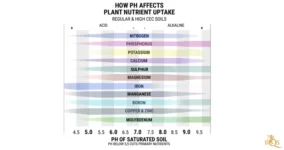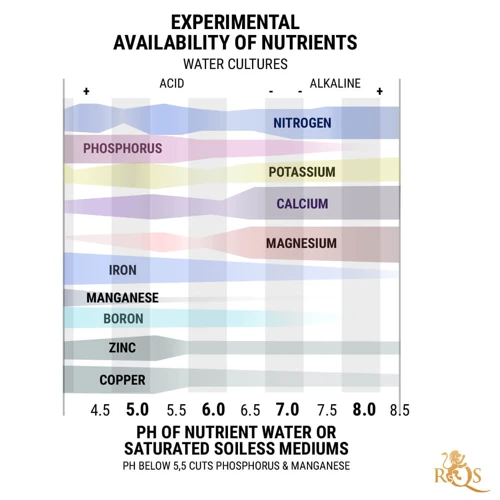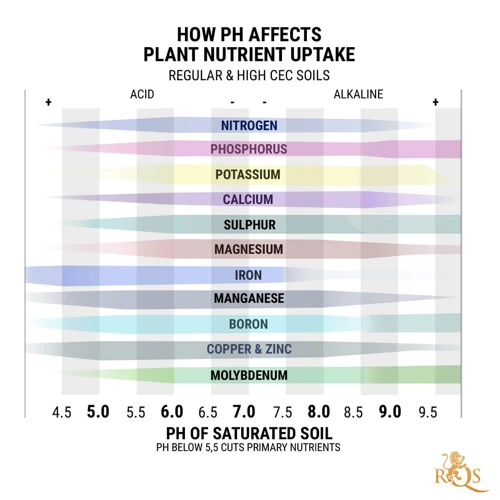
How to Understand Soil pH for Optimum Cannabis Growth with Fertilizers
Growing cannabis can be an exciting and rewarding experience. However, it is important to understand the needs of the plant to ensure maximum growth and yield. One aspect of cannabis growth that is often overlooked is the importance of soil pH. pH levels can affect the uptake of nutrients and the growth of beneficial microbes in the soil. In this article, we will explore the role of pH in cannabis growth and how to properly test and adjust soil pH using fertilizers. Whether you’re a seasoned grower or just starting out, understanding soil pH is crucial for achieving optimum cannabis growth.
What is Soil pH?
Contents
When it comes to growing cannabis, understanding the basics of soil pH is essential. So, what exactly is soil pH? Soil pH is a measure of the acidity or alkalinity of the soil, which affects the availability of nutrients to plants. It is measured on a scale of 0 to 14, with 7 being neutral. A pH below 7 is acidic, while a pH above 7 is alkaline. Soil pH significantly impacts plant growth and development, which means it’s crucial for cannabis growers to have a basic understanding of this concept to achieve optimal yields.
The Importance of pH in Cannabis Growth
Maintaining the appropriate pH range is crucial for the optimum growth of cannabis plants. Soil pH plays a key role in nutrient availability, which is crucial for the plant’s growth and development. If the pH is too high or too low, some nutrients become less available to the plant, no matter how abundant they may be in the soil. This could lead to nutrient deficiencies in the plant even when the soil has an adequate amount of nutrients.
Additionally, pH strongly affects the microorganisms that live within the soil. Microorganisms are responsible for breaking down organic matter and making nutrients more available to plants. Soil pH outside the optimal range can negatively impact soil biology, leading to fewer active microbes in the soil. This means fewer nutrients will be made available to the plants and may render some fertilizers useless.
Cannabis plants are picky with their pH requirements, and the ideal pH range for cannabis growth is between 6.0 and 7.0. Anything below 6.0 can cause a severe deficiency in some essential nutrients like calcium, magnesium, and phosphorus. On the other hand, a pH above 7.0 can limit the availability of many nutrients and can lead to toxicity symptoms in plants.
Monitoring and maintaining the soil pH in the ideal range is essential for the optimum growth and development of the cannabis plant. Understanding the importance of soil pH and how it affects nutrient availability and soil biology will help growers make informed decisions and adjust their growing conditions for maximum growth and yield.
How to Test Soil pH
One of the most important steps in ensuring optimum cannabis growth is understanding the pH of the soil. Testing soil pH is simple and can be done using pH testing kits. Here are some steps to follow:
- Step 1: Obtain a soil sample that is representative of the area where you plan to grow your cannabis plants. It’s best to take samples from different locations and combine them to get an accurate reading.
- Step 2: Add distilled water to the soil sample in a ratio of 1:1.5 (soil:water). Mix well to ensure that the soil is fully saturated.
- Step 3: Let the soil mixture sit for at least 30 minutes, stirring occasionally.
- Step 4: Using a pH testing kit, dip the pH meter into the soil mixture and take a reading. The pH meter will display a number that indicates the soil’s pH level.
- Step 5: If you prefer to use a pH testing kit that uses test strips, add a few drops of the soil mixture onto the strip and compare the color of the strip to a pH color chart to determine the pH level of the soil.
It’s important to note that soil pH can vary within a single growing area, and that pH levels can change over time due to factors such as rainfall or the use of fertilizers. It’s a good idea to regularly test the soil pH throughout the growing season to ensure the optimal pH level for cannabis growth.
The Ideal Soil pH for Cannabis Growth
Maintaining the appropriate soil pH is essential for successful cannabis growth. A pH that is too high or too low can prevent plants from absorbing the necessary nutrients, leading to stunted growth and potential crop failure. As such, it’s important for cannabis cultivators to understand the ideal soil pH for cannabis growth and how it affects the plant’s nutrient uptake and overall health. Let’s delve into this subject and explore the relationship between soil pH and cannabis growth.
The Relationship Between pH and Nutrient Uptake
The relationship between soil pH and nutrient uptake is crucial for achieving optimum cannabis growth. When the soil pH is not in the ideal range, the plant’s ability to absorb certain nutrients is limited. Here are some important points to understand about the relationship between pH and nutrient uptake:
- Acidic Soil: When the soil pH is below 6.0, cannabis plants may struggle to absorb nutrients such as phosphorus, calcium, and magnesium. This is because these nutrients become less soluble in acidic soil.
- Neutral Soil: When the soil pH is between 6.0 and 7.0, cannabis plants are able to absorb nutrients more easily. This is considered the ideal range for most plants, including cannabis.
- Alkaline Soil: When the soil pH is above 7.0, cannabis plants may have a harder time absorbing certain nutrients such as iron, manganese, and zinc. This is because these nutrients become less available in alkaline soil.
It’s important to keep in mind that different nutrients are affected by soil pH in different ways. For example, nitrogen is more available in acidic soil, while phosphorus is more available in neutral to slightly acidic soil.
By testing and adjusting the soil pH as needed, cannabis growers can ensure their plants are able to absorb and utilize the nutrients they need for strong growth and flowering.
The Effects of pH on Soil Microbes
Soil microbes are essential for plant growth and play a vital role in nutrient cycling. They are responsible for breaking down organic matter in the soil and releasing nutrients that plants can easily absorb. However, the activity and the types of soil microbes present in the soil are influenced by the soil pH. Here are some specific effects of pH on soil microbes:
- Acidophilic microbes: These types of soil microbes thrive in acidic environments (pH below 7) and are responsible for breaking down organic matter in acidic soils. When the soil pH is too high, acidophilic microbes become less active, leading to a buildup of organic matter, which can affect plant growth.
- Alkaliphilic microbes: These types of soil microbes prefer alkaline soils (pH above 7) and are important for nutrient cycling in alkaline soils. When the soil pH is too low, alkaliphilic microbes become less active, leading to nutrient deficiencies and poor plant growth.
- Bacteria and fungi: Soil bacteria and fungi are also affected by changes in soil pH. Some strains of bacteria are more effective at fixing nitrogen in soils with slightly acidic pH, while others thrive in slightly alkaline soils. Similarly, certain strains of fungi are more effective in breaking down organic matter in acid soils, while others are more efficient in alkaline soils.
- Mycorrhizal fungi: Mycorrhizal fungi play a crucial role in plant growth by forming a symbiotic relationship with plant roots. The pH of the soil affects the types of mycorrhizal fungi that can survive in the soil. For example, arbuscular mycorrhizal (AM) fungi are more abundant in slightly acidic soils, while ectomycorrhizal fungi thrive in soils with slightly alkaline pH.
It is important to note that while soil pH can have a significant impact on soil microbes, it is not the only factor that affects their activity. Other factors like soil structure, organic matter content, and moisture content can also play a role. It is important to maintain a balance of these factors to promote healthy soil microbial activity and optimal plant growth.
Adjusting Soil pH for Cannabis Growth
Maintaining the proper soil pH is crucial for the growth and development of cannabis plants. If the pH is too high or low, it can hinder nutrient uptake and cause stunted growth. Adjusting the soil pH may seem like a complex task, but with the right knowledge and tools, it can be easily done. In this section, we will explore the methods for adjusting soil pH and the different types of fertilizers that can be used for optimal cannabis growth.
Using Fertilizers to Adjust pH
One way to adjust soil pH for cannabis growth is by using fertilizers. However, it’s important to choose the right type of fertilizer and use it correctly to prevent any potential harm to the plants.
Types of Fertilizers
There are two main types of fertilizers that can be used to adjust soil pH:
- Acidifying fertilizers
- Alkalizing fertilizers
Acidifying Fertilizers
Acidifying fertilizers are used to lower the pH of the soil. Some examples of acidifying fertilizers include sulfur, ammonium nitrate, and urea. When these fertilizers are applied to the soil, they release hydrogen ions, which react with the soil particles to lower the soil pH.
It’s important to note that acidifying fertilizers should be used with caution as they can lower the pH too much, making it difficult for the plants to absorb nutrients. It’s also important to avoid over-application, as this can lead to toxicity in the plants.
Alkalizing Fertilizers
Alkalizing fertilizers are used to raise the pH of the soil. Some examples of alkalizing fertilizers include limestone, wood ash, and dolomite. When these fertilizers are applied to the soil, they release hydroxide ions, which react with the soil particles to raise the soil pH.
Just like with acidifying fertilizers, it’s important to use alkalizing fertilizers with caution to prevent over-application and potential damage to the plants.
Using Fertilizers to Adjust pH
To use fertilizers to adjust soil pH for cannabis growth, it’s important to start by testing the soil pH to determine whether it needs to be adjusted. Once the pH has been determined, the appropriate fertilizer can be chosen to either lower or raise the pH.
It’s important to follow the instructions on the fertilizer label carefully and avoid over-application. It’s also a good idea to apply the fertilizer in several smaller doses over a period of time rather than all at once to prevent any sudden changes in soil pH that could harm the plants.
Remember, while fertilizers can be a helpful tool for adjusting soil pH, it’s important to use them correctly and with caution to avoid any potential harm to the plants.
Organic vs Chemical Fertilizers
When it comes to fertilizers, there are two main categories: organic and chemical fertilizers. Organic fertilizers are made from natural materials like compost or animal manure, while chemical fertilizers are made artificially in a lab.
Organic fertilizers are often touted as the more environmentally friendly option since they release nutrients slowly over time and can improve soil health. They also tend to be less harsh on plant roots, reducing the risk of burning. However, organic fertilizers can be more difficult to measure and apply accurately.
Chemical fertilizers are often more precise and can be tailored to specific nutrient needs, making them a popular choice for commercial growers. They also tend to produce faster results. However, they can be more costly and are not as sustainable as organic options.
It’s important to note that whether you choose organic or chemical fertilizers, the pH of your soil will still play a crucial role in the success of your cannabis plants. Adjusting pH levels with the appropriate fertilizers can help ensure optimal nutrient uptake and healthy soil microbes.
Conclusion
In conclusion, understanding soil pH is crucial for achieving optimum cannabis growth. pH affects everything from nutrient uptake to soil microbes, and as such, maintaining the ideal pH range is essential. Testing soil pH should be a regular part of a cannabis grower’s routine, and adjustments should be made as necessary.
Using fertilizers to adjust soil pH is a common tactic, with both organic and chemical options available. Organic fertilizers offer the advantage of being environmentally friendly and sustainable, while chemical fertilizers tend to be more precise and provide quick results. Ultimately, the choice between organic and chemical fertilizers depends on personal preference and the specific growing situation.
It’s also worth noting that adjusting soil pH is just one aspect of providing the best growing conditions for cannabis. Proper ventilation, lighting, and irrigation practices are also important factors that need to be considered.
Overall, paying attention to soil pH and making the necessary adjustments can lead to healthier plants and a better yield. By keeping the pH within the ideal range and using the appropriate fertilizers, cannabis growers can optimize their crops and achieve the desired results.
Frequently Asked Questions
Q: Why is pH important for cannabis growth?
A: pH is important for cannabis growth because it affects nutrient uptake and the activity of soil microbes. This can impact the plant’s overall health and yield.
Q: What is the ideal pH range for cannabis growth?
A: The ideal pH range for cannabis growth is typically between 6.0 and 7.0. However, some growers may have success outside of this range depending on their specific growing conditions.
Q: How can I test the pH of my soil?
A: You can test the pH of your soil using a pH meter, pH testing strips, or a soil testing kit. These can be purchased at gardening stores or online.
Q: What happens if soil pH is too high or too low?
A: If soil pH is too high or too low, it can impact nutrient availability and uptake. This can lead to nutrient deficiencies or toxicities, which can affect plant growth and yield.
Q: Can using fertilizers help adjust soil pH?
A: Yes, certain fertilizers can help adjust soil pH. However, it’s important to choose the right fertilizer for your specific needs and to use it according to the instructions to avoid over- or under- correcting the pH.
Q: What is the difference between organic and chemical fertilizers?
A: Organic fertilizers are made from natural sources, like compost or manure, while chemical fertilizers are made from synthetic sources. Organic fertilizers are often slower to release nutrients and may have additional benefits for soil health compared to chemical fertilizers.
Q: Can adjusting soil pH with fertilizers be harmful to the plant?
A: Adjusting soil pH with fertilizers can be harmful if done incorrectly. Over-correcting or under-correcting the pH can lead to nutrient imbalances, which can harm the plant. It’s important to use the correct amount of fertilizer and to monitor the plant for signs of stress.
Q: Can soil pH vary within a single grow operation?
A: Yes, soil pH can vary within a single grow operation based on factors like watering practices, soil composition, and nutrient inputs. It’s important to regularly test the soil pH to ensure it remains within the ideal range for cannabis growth.
Q: Can adjust soil pH impact the flavor of cannabis?
A: Yes, adjusting the soil pH can impact the flavor of cannabis. Nutrient imbalances can affect terpene and cannabinoid production, which can affect the overall flavor and aroma of the plant.
Q: Can soil pH impact the potency of cannabis?
A: Yes, soil pH can impact the potency of cannabis. Nutrient imbalances can affect cannabinoid production, which can impact the overall potency of the plant.




